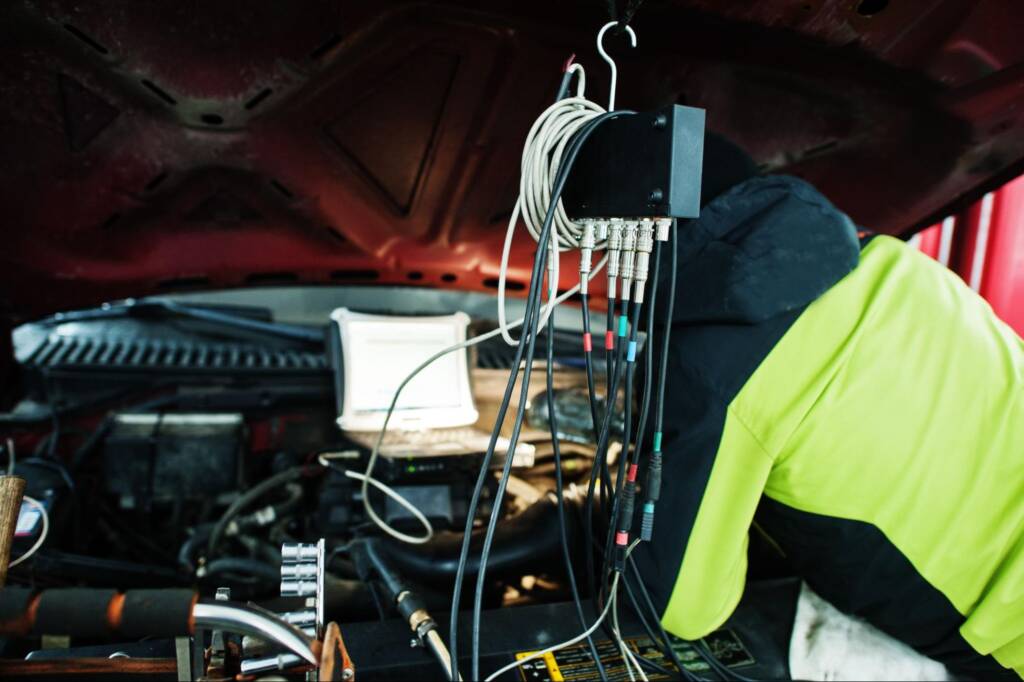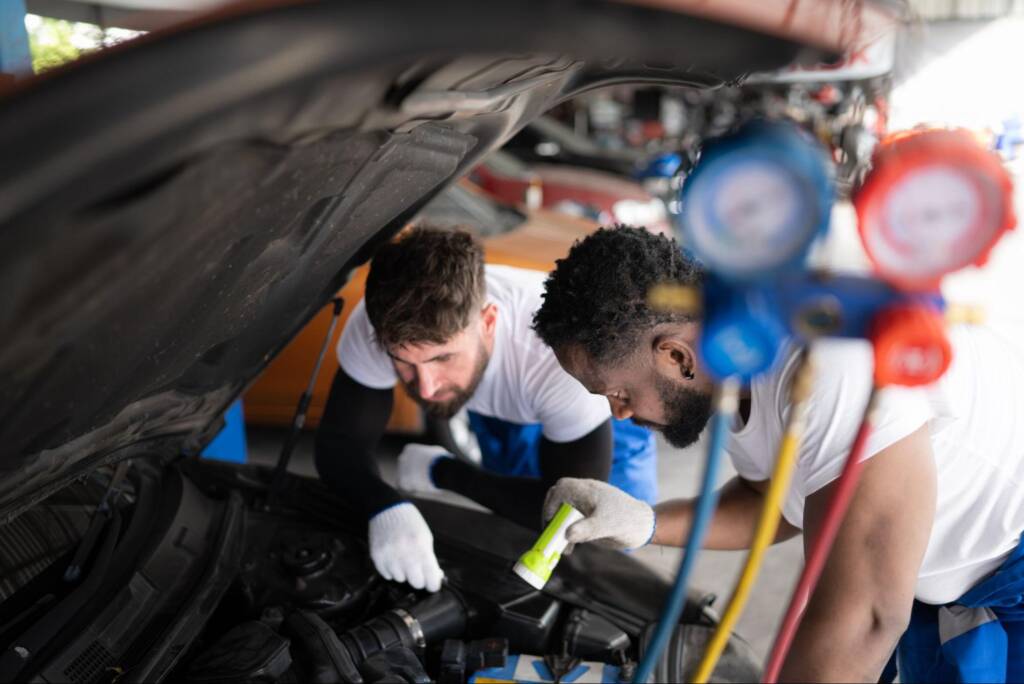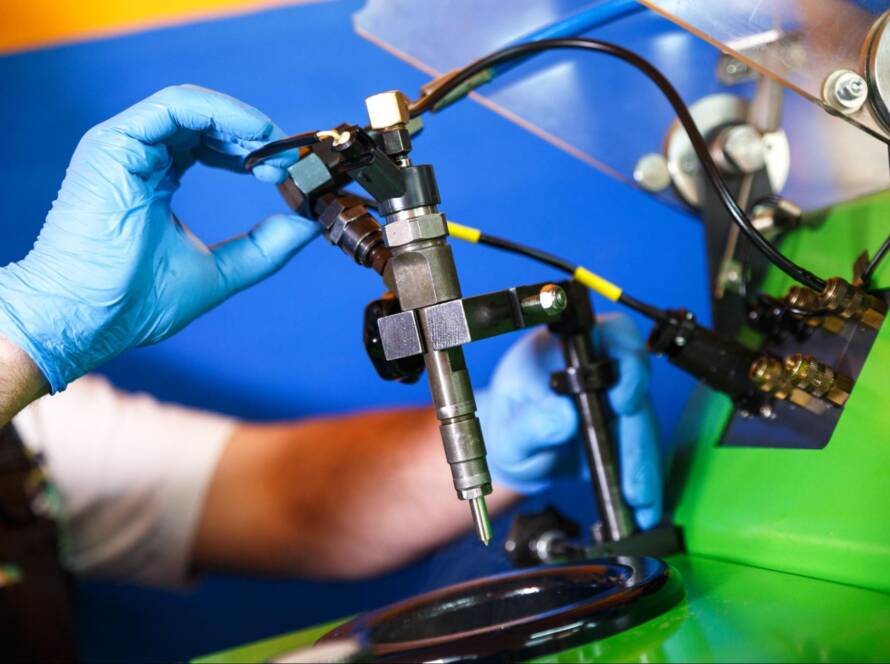Fuel costs continue to rise, yet some vehicles consume gas at an unprecedented rate. Drivers often blame the fuel or the weather, but the real problem is usually hidden deeper. A struggling engine might still run, but it’s not running well. Beneath the hood, clogged or malfunctioning fuel injectors can quietly drain performance and increase emissions. Ignoring them for too long turns a simple test into an expensive fix.
Understanding Fuel Injection Testing
A well-tuned fuel injection system delivers the right amount of fuel into each engine cylinder. When that flow is disrupted, engine performance begins to suffer. Fuel injection testing is how technicians verify the health and operation of those injectors. While many drivers associate it with high-performance vehicles, it applies to all cars, trucks, and SUVs.
What Fuel Injection Testing Involves
Fuel injectors spray fuel in a fine mist directly into your engine. This spray pattern must be even, precise, and delivered at the exact moment. Fuel injection testing checks for spray consistency, pressure levels, and injector responsiveness. Technicians utilize tools such as flow benches, scan tools, and pressure gauges to perform their tasks. These readings help identify clogs, leaks, or weak injectors before they cause bigger problems.
Signs Your Vehicle May Need Testing
Poor gas mileage is one of the earliest signs that something is off. You may also notice rough idling, sudden stalling, or slow starts. If your engine feels weak when accelerating or produces more smoke than usual, it’s time for a check. Failing emissions tests can also signal dirty or malfunctioning injectors. These symptoms don’t resolve themselves; they usually worsen.
How Often to Schedule Routine Fuel Injection Testing
Fuel injection testing doesn’t follow a universal schedule. The proper interval depends on your engine design, driving conditions, and the quality of your fuel. Some cars handle longer gaps between tests, but others develop problems sooner. Staying in tune with your vehicle’s specific needs helps avoid breakdowns and keeps repairs predictable.
Manufacturer Guidelines and Baseline Recommendations
Most manufacturers recommend testing your injectors every 30,000 to 60,000 miles. However, your car’s owner’s manual is the best place to start. Some engines have more sensitive fuel systems that require tighter intervals. If your vehicle runs rough before hitting that mileage, don’t wait. Early testing can keep you from dealing with extensive engine wear.
Driving Conditions That Accelerate Testing Needs
City driving with lots of stop-and-go traffic strains your fuel system. This pattern causes more carbon buildup in the injectors. Similarly, using low-quality gas or infrequently replacing filters can cause them to clog more quickly. Short trips, especially in cold climates, don’t allow the engine to reach optimal temperature. All these conditions lead to early injector wear and require earlier testing.
Fuel Type and Additive Usage
Gasoline and diesel engines handle injectors differently. Diesel injectors work under higher pressure, making them more prone to wear. Ethanol-blended fuels can also increase deposits inside the injector nozzles. While fuel additives help clean some buildup, they can’t fix mechanical injector problems. Testing remains the only reliable way to assess real injector performance.
Vehicle Age and Maintenance History
Older vehicles often need more frequent fuel system checks. Wear and tear over time can lead to carbon buildup and injector fatigue. If the car hasn’t received consistent maintenance, injector issues may appear sooner. Previous use of poor-quality fuel or skipped services also increases the risk. Knowing the maintenance history helps determine how soon testing should be scheduled.

Use Diagnostic Data and Service Records
Modern vehicles store valuable performance data through the ECU. Mechanics can scan this data to spot injector inefficiencies before symptoms appear. Reviewing service history helps identify patterns, such as recurring fuel issues or missed scheduled maintenance, including filter changes. Using this data-driven approach makes testing decisions more accurate and informed. It adds precision beyond guesswork or rough mileage estimates.
What Happens if You Skip Fuel Injection Testing?
Ignoring your injectors won’t just affect mileage; it can damage your engine. Fuel delivery problems gradually affect the way your car drives, idles, and starts. These changes often occur gradually, so drivers overlook them. But the consequences grow with every mile. Left unchecked, fuel system issues can result in substantial repair bills.
Gradual Decline in Performance
Your car may lose its throttle response or struggle on hills. Acceleration can feel sluggish, even when you press harder on the gas. Over time, cold starts to take longer and sound rougher. These changes often result from uneven fuel spray or low fuel pressure. If you’re adding gas more frequently, your injectors might be to blame.
Hidden Engine Wear and Costly Repairs
A leaking injector can wash away the oil that protects your cylinders. That leads to metal-on-metal contact and long-term engine damage. Clogged injectors can cause lean conditions, overheating, and detonation. Over time, this affects spark plugs, oxygen sensors, and catalytic converters. What starts as a minor issue can snowball into a complete engine overhaul.
Failed Emissions and Safety Risks
Faulty injectors increase hydrocarbon emissions, making smog tests harder to pass. You might also notice the check engine light flickering or staying on. Misfires caused by bad injectors can trigger safety issues while driving. They lead to erratic RPMs, jerky acceleration, or sudden stalls. Avoiding these risks starts with proactive injector testing.
Benefits of Timely Fuel Injection Testing
Fuel injection testing gives you a clearer picture of your engine’s condition. It helps identify issues that may not always trigger dashboard lights. When done regularly, this testing enhances your vehicle’s performance and extends its lifespan. You’ll also see gains in fuel efficiency and reduced emissions. These benefits stack up over time.
Improved Efficiency and Performance
Clean, correctly functioning injectors burn fuel more evenly. This results in stronger combustion and smoother power delivery. Your engine won’t have to work as hard to maintain speed. Fuel economy often improves after a proper cleaning or repair. Even older engines can feel more responsive after testing and adjustments.
Lower Emissions and Environmental Impact
Dirty injectors cause incomplete combustion, which releases harmful gases. Regular testing and maintenance reduce emissions by restoring optimal fuel burn. That means fewer pollutants coming from your tailpipe. In regions with strict emissions rules, passing inspection becomes easier. You also contribute less to environmental pollution over time.
Extends Engine Lifespan
Clean fuel injectors protect your engine from internal stress. Balanced fuel delivery ensures even combustion across all cylinders. It reduces wear on pistons, rings, and cylinder walls. Over time, that means fewer breakdowns and less money spent on repairs. It also helps delay the need for engine replacement.

Smoother Driving and Better Ride Quality
When injectors spray fuel evenly, the engine runs smoother. You’ll notice less vibration when idling and fewer jerks during acceleration. Shifts between gears become more fluid, especially in automatic transmissions. That means a more comfortable drive, especially during long trips or in traffic. A cleaner fuel system enhances every mile behind the wheel.
Fewer Long-Term Repair Surprises
Routine testing helps you stay ahead of expensive mechanical failures. Caught early, injector issues can be fixed without needing part replacements. It also prevents chain-reaction damage to other engine components. Think of it as insurance against unexpected breakdowns. Staying ahead of problems gives you more control over repair costs and timing.
Best Practices for Scheduling Fuel Injection Testing
Sticking to a routine keeps your fuel system in top shape. Fuel injectors rarely give off loud warning signs early on. That’s why regular inspection matters. Building testing into your car care routine saves time, stress, and money. Consider it just as essential as oil changes or tire rotations.
Combine Testing With Regular Maintenance
Timing your injector checks with other services keeps things simple. For example, get them tested during spark plug changes or air filter replacements. It prevents overlap and keeps your engine running smoother and longer. Technicians can also spot problems early when systems are reviewed together. Routine scheduling makes diagnostics less stressful.
Monitor Fuel System Warning Signs
Pay close attention to dashboard warnings or fuel economy changes. Sudden drops in performance shouldn’t be ignored. Odd smells, ticking sounds, or misfires during acceleration also point to injector issues. You don’t have to wait for a warning light to act. Being proactive helps reduce long-term wear and tear.
Get Professional Testing, Not Just a Cleaner
Fuel system cleaners might improve minor deposits, but they can’t fix hardware problems. Testing by a trained technician gives accurate insight into injector health. Professional automotive specialists can spot early failure patterns or inconsistent spray patterns. Their tools go deeper than off-the-shelf cleaners ever can. For real results, trust certified service centers.
Use Mileage and Seasons As Reminders
Every 30,000 to 50,000 miles is a smart baseline for testing. If that’s hard to track, consider testing before long road trips or harsh weather seasons—cold winters and hot summers both stress fuel systems. Scheduling service checks during the spring or fall helps catch wear from the previous season. Seasonal habits make testing easy to remember and harder to skip.
Take Fuel Injection Testing Off the Back Burner
Clean injectors aren’t just about smoother rides or better mileage; they’re about keeping your engine honest, efficient, and ready for anything. Every day of hesitation gives the buildup more time to spread. The fix is simple: act before the warning lights and breakdowns choose for you. Book the test, clear the doubt, and drive like your car wants to be driven.
Want more smart tips for a smoother ride? Visit the Dark Night Specialties blog and stay ahead of car trouble.


